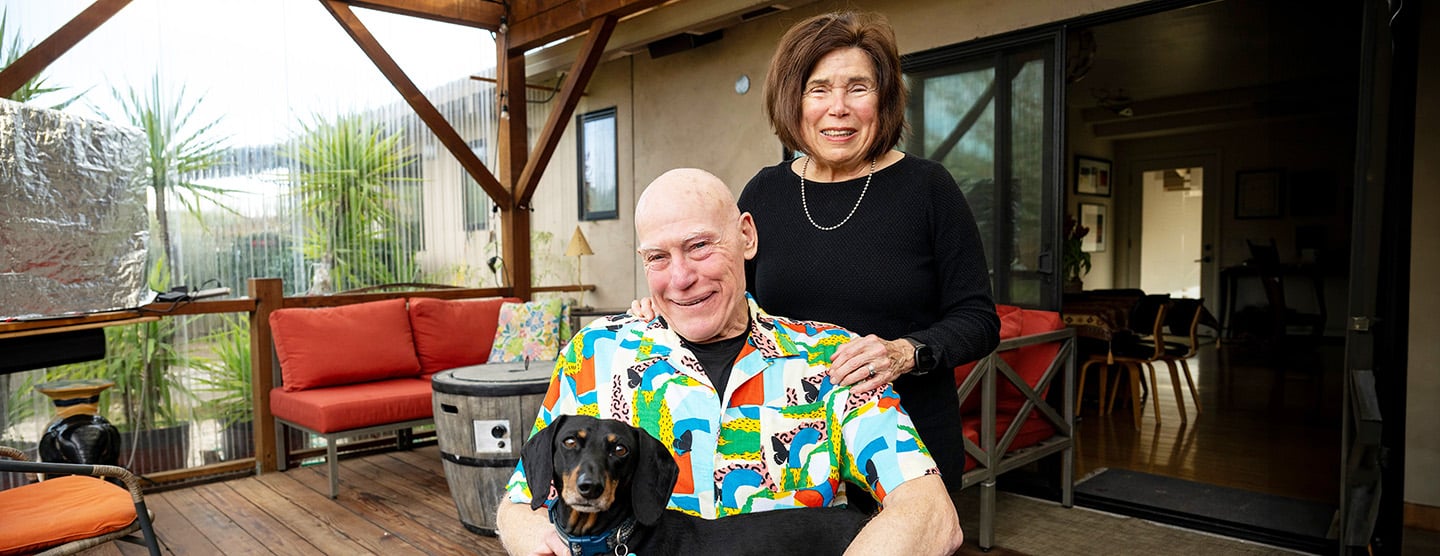The UCSF Comprehensive Stroke Center is a nationally recognized program that provides the most advanced diagnostic methods and treatments for stroke patients and patients at risk of stroke. Our team includes doctors from a wide range of specialties, including emergency medicine, vascular surgery, neurosurgery, neuroanesthesiology, diagnostic neuroradiology, neurocritical care, vascular neurology and neurointerventional radiology, as well as highly trained nurses, pharmacists, physical therapists, occupational therapists, speech therapists, case managers, social workers and medical technologists.
The team's collective expertise allows us to deliver outstanding innovative care at every level, from emergency services and in-hospital treatments to outpatient care and rehabilitation therapy. And we're proud of the recognition we've received for providing exceptional care.
We're certified as a comprehensive stroke center – the highest certification – by the Joint Commission, American Heart Association and American Stroke Association, and we're the first San Francisco program to be awarded a gold seal of approval in recognition of our ongoing commitment to quality care for stroke patients. UCSF is also part of NIH StrokeNet, the National Institutes of Health's network of 25 regional centers recognized as leaders in comprehensive care and research on stroke prevention, treatment and recovery.
Inpatient care
A stroke can occur because of a blockage in blood flow to the brain (ischemic stroke) or because of bleeding in the brain (hemorrhagic stroke). Our inpatient service provides 24/7 emergency care for acute ischemic stroke, transient ischemic attack (TIA), subarachnoid hemorrhage and intracerebral hemorrhage; the service includes experts and specialized programs to treat aneurysms, arteriovenous malformations (AVMs) and cavernous malformations.
Patients may be transferred from other hospitals or admitted through the UCSF Emergency Department. In such cases, speedy treatment is key to preventing brain injury. Possible treatments include administering intravenous clot-busting drugs, physically removing blood clots (using a device that's threaded through blood vessels), coiling or clipping procedures for aneurysms, and surgical removal of AVMs or cavernous malformations.
Outpatient care
Patients at risk of stroke, seeking second opinions or needing follow-up care after discharge are seen in our stroke clinic or one of several other UCSF clinics. These clinics also provide care for stroke patients who need nonurgent evaluations, treatment or monitoring.
Patients who are recovering from a stroke or need rehabilitative care for acquired neurological injuries, including those resulting from stroke, may be seen in the UCSF Neurorecovery Clinic.
Interested patients may have access to investigational therapies related to stroke care by participating in our research programs or joining a clinical trial at UCSF. Patients who have had a stroke may be eligible to join the Stroke Recovery Initiative, a national registry that connects patients with relevant studies in which they may wish to participate.
Learn more about clinical trials and how they work.
Awards and recognition
-

Among the top hospitals in the nation
-

Rated high-performing hospital for stroke
-

Best in the West and No. 3 in the nation for neurology & neurosurgery
-

Certified comprehensive stroke center
Stroke Center clinics (7)
 2
2
Cerebrovascular Neurosurgery Clinic

HHT Center of Excellence

Neurointerventional Radiology
Patient stories
After a-fib and a stroke, he's back on his bike
Gary had a history of atrial fibrillation – and then a life-threatening stroke. Thanks to an embolectomy and UCSF's comprehensive care, he enjoyed a full recovery.
Safe, effective treatment
UCSF is dedicated to continually raising the bar for exceptional neurovascular care, and we work to make sure our patients' outcomes reflect that.
For example, for the three-year period from Jan. 1, 2021, to Dec. 31, 2023, we maintained a stroke or mortality complication rate after an elective diagnostic angiogram of 0.06%. Our complication rate after carotid revascularization procedures (carotid endarterectomy [CEA], carotid artery stent [CAS], or transcarotid artery revascularization [TCAR]) was 0.95% percent for asymptomatic carotid stenosis and 2.03% for symptomatic carotid stenosis during the same period.
| Quality Metric | |
| Complications or in-hospital mortality after diagnostic angiogram | 1/2021-12/2023 |
| 24-hour stroke complication rate | 0.06% |
| 24-hour mortality complication rate | 0.0% |
| Stroke or death within 30 days after carotid revascularization procedure (CEA/CAS/TCAR) | 1/2021-12/2023 |
| Asymptomatic carotid stenosis | 0.95% |
| Symptomatic carotid stenosis | 2.03% |
Our center is part of the Neurology and Neurosurgery department and the UCSF Weill Institute for Neurosciences.








